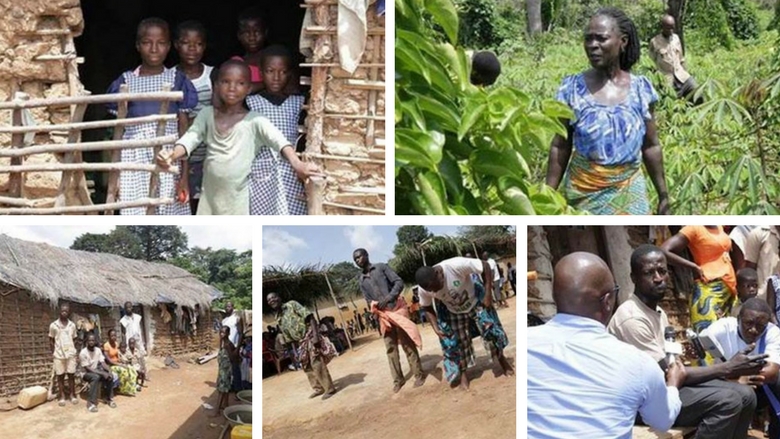Challenge:
Cote d’Ivoire was plagued by a decade-long harrowing internal conflict followed by economic decline. While the conflict ended in 2011, poverty remained rampant in rural areas where child malnutrition and childhood stunting remained high. In 2011, 35 percent of children were reported as stunted.
A comprehensive social safety nets system was not available as well there weren’t any targeted livelihoods support in place. A major challenge facing the Government was that a vast majority of households living in hard-to-reach rural areas had not been identified and did not receive basic social services. Likewise, vulnerable populations often lack support to improve livelihoods through access to broader markets. The urgency of finding creative ways of expanding social protection and livelihood support to the poorest was clear.
Approach:
The project provided cash transfers to targeted poor households and accompanying measures to promote investments in human capital and livelihoods, and develop the foundations for a national, productive social safety net system that would serve broader social protection and labor programs, reflecting the Government’s 2014 National Social Protection Strategy and National Employment Plan.
Key elements include: (i) a targeting system for cash transfers; (ii) a social protection household registry; (iii) a cash transfer payment system using digital mobile money technology; and (iv) management information system and capacity-building.
The project has accelerated the government’s pro-poor spending, expanding coverage from less than 1 percent to 3 percent of all poor households in Côte d’Ivoire between 2015 to present.
The main innovation to date includes leveraging digital money accounts as a dual benefit – expanding coverage for income support to poor households while also expanding coverage of digital financial inclusion. Through the project, all beneficiaries are now able to use a mobile phone and access mobile money.
In addition, through their access to mobile technology and identification in a social household registry,
people who had not previously been identified in the social protection system can now be reached and targeted in a more effective way, giving them access to other social services.
Through a public-private partnership, the project worked with mobile money operators to first find a way to provide these households with mobile accounts. Once identified and the accounts set up, it became a form of identification. A routine was then scheduled for transferring social benefits to areas that are very difficult for social workers to reach—thereby circumventing significant infrastructural weaknesses, while also ensuring financial inclusion and the redistribution of economic benefits to the most vulnerable.
Results:
- Supported the government’s efforts in implementing a well-targeted national productive social safety net and livelihoods program, one that is inclusive.
- The project ensured that for the first time in Côte d’Ivoire, vulnerable households in hard-to-reach areas were identified through a systematic approach and received digital cash transfers using mobile money technology for all.
- To date, 300,000 poor individuals—more than half of whom are women — have benefitted from mobile money accounts with cash transfers and access to digital financial inclusion as a result.
- 720,000 individuals have been registered with the program’s social registry to date. It spans across 16 regions in the Northern, Western and Central zones, with scale-up planned to national coverage over time.
- A public-private partnership framework was built by working with mobile money operators to find a way to provide vulnerable households with mobile accounts. Once the households had been identified and the mobile accounts set up – it also became a form of identification.
- The project contributed in reducing administrative and transactional costs in executing social protection programs. Beneficiaries in rural areas avoided incurring high travel costs associated with picking up cash-transfers. Digital payments also likely reduced risks of street crime/theft associated with picking up cash payments (often at publicly known times).
- The gender and social impact have been particularly high with 51% of beneficiaries are women. Digital payments can be an introduction to the formal economy and help increase women’s economic empowerment. Anecdotal evidence showed that women have become increasingly active in terms of farming and income generating activities - specifically in the cooperatives where their involvement and level of activity notably increased.
